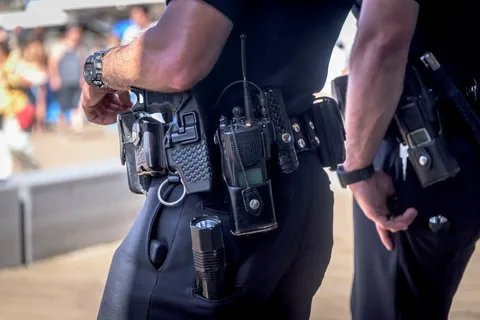How Can Law Enforcement Training Be Modernized to Meet Today’s Challenges?
Learn how law enforcement training can be modernized to meet today's challenges, including technology, mental health, diversity, and real-world scenarios.

Training for law enforcement is essential to ensure officers are ready to handle the complexities of modern policing. However, with rapid changes in technology, society, and crime, training methods must evolve to address new challenges. Modernizing law enforcement training is not just about using new tools; it’s about preparing officers to work effectively, safely, and respectfully in a fast-changing world. In this article, we’ll explore how law enforcement training can be modernized to meet today’s challenges.
1. Incorporating Advanced Technology in Training
One of the most significant ways to modernize law enforcement training is by incorporating new technologies. Today’s officers face situations where traditional training methods may not be enough. Virtual reality (VR) and augmented reality (AR) offer an immersive way for officers to experience high-risk scenarios without real-world consequences.
With VR, officers can practice responding to emergencies, traffic stops, or active shooter situations, all in a controlled environment. This type of hands-on learning improves decision-making and builds confidence, helping officers react quickly and effectively in the field. Technology like this allows for more flexible, realistic, and interactive training experiences.
2. Emphasizing Mental Health and Emotional Resilience
Law enforcement is a demanding and often stressful job. Modernized training must address mental health and emotional well-being to ensure officers are prepared for the psychological demands of their work. Stress management techniques, coping strategies for dealing with trauma, and building emotional resilience should be incorporated into training programs.
Understanding mental health is also crucial when engaging with the public. Officers should be trained to recognize signs of mental illness and learn how to approach these situations with care and empathy. This shift in training can lead to better outcomes in interactions with the public and help reduce the likelihood of unnecessary use of force.
3. Enhancing Communication Skills
In today’s society, clear communication is vital for effective policing. Modernizing training should place a greater emphasis on communication skills, including de-escalation techniques and active listening. Officers need to understand how to interact with people from all backgrounds, especially in tense or stressful situations.
Training programs should include scenarios where officers practice diffusing conflict, engaging with people respectfully, and building rapport. These skills are key for reducing misunderstandings and improving relationships with the community, fostering trust, and creating safer environments.
4. Training for Emerging Crime Trends
Crime is constantly evolving, and law enforcement must stay ahead of these changes. Modernized training programs need to address emerging crime trends, including cybercrime, human trafficking, and identity theft. Officers should learn how to investigate digital crimes, gather evidence from electronic devices, and protect themselves from cyber threats.
Training should also cover social media and its role in crime. Officers should understand how to use social media for investigations, as well as how to manage incidents involving online harassment or dangerous online behavior.
5. Prioritizing Diversity and Cultural Competency
In today’s world, law enforcement must be prepared to serve diverse communities. Modernized training should place a strong focus on cultural competency, ensuring officers understand the different cultures, values, and challenges within their communities. This helps officers interact with the public more effectively and with respect.
Training should also address unconscious bias and provide officers with strategies for avoiding bias in decision-making. This will help ensure that all community members are treated fairly and equitably, leading to better relationships between law enforcement and the public.
6. Scenario-Based Training and Real-World Simulations
One of the most effective ways to modernize law enforcement training is through scenario-based learning. Real-world simulations allow officers to practice responding to a variety of situations they might encounter on the job. These simulations can cover everything from routine traffic stops to complex active shooter scenarios.
In these exercises, officers must make quick decisions, prioritize actions, and manage stress, all while staying within legal and ethical guidelines. Modern training programs should incorporate a wide range of realistic, high-pressure situations, so officers are prepared for any challenge they may face.
7. Continuous Learning and Professional Development
Training for law enforcement can no longer be a one-time event. As society and crime continue to change, officers need to stay current with new laws, technologies, and best practices. Modernized training should include continuous professional development, with opportunities for officers to learn throughout their careers.
Online courses, workshops, and refresher training programs can help officers stay up-to-date on the latest developments in law enforcement. This ongoing education ensures that officers continue to improve their skills and knowledge, which ultimately leads to better policing.
8. Collaboration with Other Agencies and Community Partners
Modern policing requires collaboration with other law enforcement agencies, social service organizations, and community groups. Law enforcement training should focus on teamwork, coordination, and communication across various organizations. Officers should learn how to work together with other agencies, such as mental health professionals or community outreach programs, to address complex issues like homelessness, substance abuse, or domestic violence.
By fostering interagency cooperation, officers can improve their effectiveness and respond to situations in a more holistic and comprehensive way.
Conclusion
Modernizing law enforcement training is essential to meet the challenges of today’s fast-paced, diverse, and technology-driven world. By incorporating new technologies, emphasizing mental health, improving communication skills, addressing emerging crime trends, and promoting diversity, training programs can better prepare officers for the complex situations they face.
Programs like Blue Force Learning are leading the way in offering comprehensive training solutions that help officers develop the skills needed for modern policing. By prioritizing these changes, law enforcement can build trust within the community, improve officer safety, and ensure a more effective and fair justice system for everyone.
With these modernized training methods, law enforcement will be better equipped to handle the challenges of the 21st century, making our communities safer and stronger
What's Your Reaction?




















